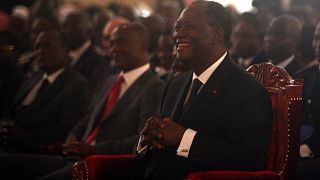Ivory Coast
A new mobile phone designed and assembled in Ivory Coast is helping illiterate users to overcome difficulties.
Thanks to a voice control system users can now access information in 50 African languages.
"It’s a phone can easily be adapted for us. And it’s a phone which will be of great help to one of my parents who cannot read", (...) "It is now possible for a parent to have a letter in front of him or her, take a picture of it and for it to have it read back in his or her native language. And I really liked that part" said customer Floride Jogbé.
Official numbers suggest that in Ivory Coast, 40% of people are illiterate.
For the older generation, the new voice-activated assistant is a powerful tool.
The smartphone uses an operating system unique to the Cerco company, and covers 17 languages spoken in Ivory Coast.
The founder of the company behind the new phone claims this is a response to the "frustration" illiterate users feel with technology currently on offer.
"We have a large portion of the population that is illiterate. And so, if we bring a computer or a phone as it existed before, our parents must be able to read first and then write, in order to communicate. I gave my father his first phone 15 years ago. He was very happy, but also very embarrassed to use it because every time he has to ask someone to help him dial a number. When he gets a message, he needs help reading it", said Alain Capo-Chichi, president and founder of the company that makes the "Superphone".
The company hopes to incorporate 1,000 African languages and reach almost a billion people in the future.
"Speaking is three times faster than writing, so when I speak, instead of writing, on one hand it's fast, which makes life easier, but on the other hand we have an engine which allows you to interpret what you said to provide an appropriate and adapted answer to what you expect. We have done a lot of work on African languages, so it allows our parents who are not literate to directly use their phone in their language", said the company president.
In exchange for government tax breaks, Cerco is to pay 3.5 percent of its income to the state and train around 1,200 young people each year.











Go to video
In Kenya, 90% of packaged food needs health warning label under new rules
00:52
Nigeria’s Peter Obi to contest 2027 election, opposition coalition in jeopardy
Go to video
Cameroon’s Tourism Minister joins presidential race as Biya’s silence fuels uncertainty
Go to video
INTERPOL seizes $65M in fake drugs, arrests 769 in largest-ever global crackdown
Go to video
Uganda's Museveni breaks African silence on Israel-Iran war
Go to video
Over 40 killed in attack on Sudanese hospital: WHO Chief condemns “Appalling” strike